Looking to gain weight on a plant-based diet? Check out our expert-curated list of the best veg weight gain foods, packed with essential nutrients and delicious flavors. Start your healthy weight gain journey today!
Are you looking to put on some healthy weight without compromising your love for veggies? Look no further! Discover a wide array of nutrient-packed vegetable-based foods that can help you achieve your weight gain goals while promoting overall well-being.
From creamy avocado toast topped with nutrient-dense seeds to delectable sweet potatoes stuffed with hearty quinoa and greens, our collection of veggie-based weight gain foods is sure to delight your taste buds and nourish your body. Embrace the burstiness of flavors with mouthwatering vegetable soups, mixed bean salads drizzled in tangy dressings, and colorful veggie stir-fries that will keep you coming back for more.
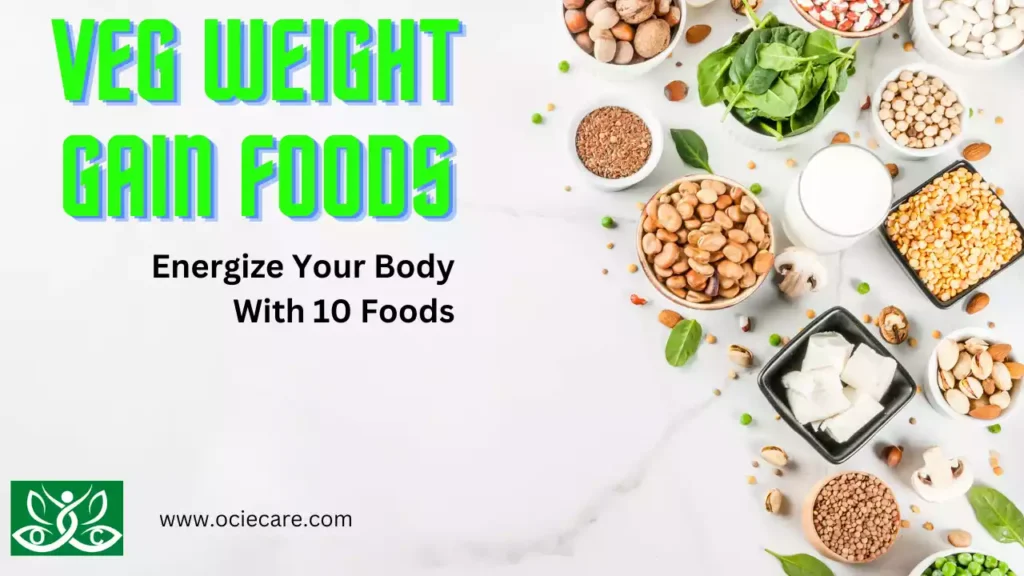
Introduction On Veg Weight Gain Foods
Embarking on a weight gain journey doesn’t mean you have to compromise on nutrition. These veggie delights are powerhouses of vitamins, minerals, and essential nutrients that support your body’s needs. You’ll find plant-based proteins that help build lean muscle mass, healthy fats that keep your heart happy, and fiber that supports your digestive system.
Whether you’re an athlete striving for peak performance or simply looking to stay active and energized, these veg weight gain foods have got you covered. Say goodbye to monotonous meal plans and embrace the delightful diversity that our veggie-packed dishes offer. Discover the energy they provide, keeping you fueled throughout your day.
Why settle for bland and repetitive meals when you can enjoy a burst of flavors while nourishing your body? Our carefully crafted collection of veg weight gain foods will leave you amazed and motivated on your health journey. So, what are you waiting for? Dive into the perplexing world of nutrient-packed vegetables and embrace the burstiness of life with each mouthful!
Unlock the secrets of healthy weight gain today and let the power of veggies transform your life!
Why Choose a Veg Weight Gain Foods?
The Top Reasons to Choose Veg Weight Gain Foods
Are you on the lookout for a healthy and sustainable way to gain weight? Look no further than the power of veg weight gain foods! Here are some compelling reasons why you should opt for these nutrient-packed options to achieve your weight gain goals:
I. Nutrient Density:
- Veg weight gain foods are rich in essential vitamins, minerals, and nutrients that are vital for your overall well-being.
- From vitamin-packed leafy greens to fiber-rich legumes, these foods provide a wide range of nutrients that support your body’s needs.
II. Balanced Nutrition:,Unlike processed and unhealthy high-calorie foods, veggie-based weight gain options offer a more balanced nutritional profile.
- They provide the necessary macronutrients like proteins, healthy fats, and carbohydrates, ensuring your body gets all the fuel it needs.
III. Gentle on Digestion:
- Veggie foods are generally easier to digest compared to heavy and greasy meals.
- This is especially beneficial for those with sensitive stomachs or digestive issues.
- You can comfortably increase your caloric intake without feeling overly stuffed or uncomfortable.
IV. Heart Health:
- Plant-based foods, such as avocados, nuts, and seeds, are heart-friendly and can support your cardiovascular health.
- Choosing veg weight gain foods allows you to promote weight gain while taking care of your heart.
V. Sustainability:
- A diet based on vegetables and plant-based foods is more sustainable and eco-friendly compared to animal-based alternatives.
- By choosing veggie options, you contribute to a healthier planet and a more ethical food system.
VI. Diverse Flavors:
- Embrace the burstiness of flavors that veggie foods offer! From spicy curries to refreshing salads, you’ll never run out of exciting and tasty options to satisfy your taste buds.
VII. Supports Active Lifestyles:
- If you lead an active lifestyle, veg weight gain foods can provide the necessary energy and nutrients to fuel your workouts and daily activities.
- They are a great choice for athletes and fitness enthusiasts.
VIII. Weight Management:
- Veggie-based weight gain foods can help you manage your weight in a healthier way.
- Unlike unhealthy weight gain, which often involves consuming empty calories, a veggie-centric approach ensures that you gain weight in a more controlled and beneficial manner.
IX. Promotes Digestive Health:
- The high fiber content in many vegetables supports healthy digestion, helping to regulate bowel movements and improve gut health.
X. Customizable Options:
- Veg weight gain foods offer endless possibilities for creativity in the kitchen.
- You can experiment with various recipes and combinations to find what works best for your palate and nutritional needs.
Understanding Healthy Weight Gain and Nutrient Requirements
Healthy weight gain is a goal that many individuals pursue for various reasons, such as improving athletic performance, recovering from an illness, or simply achieving a more balanced physique. However, it’s essential to approach weight gain in a mindful and informed manner to ensure that it promotes overall well-being and doesn’t compromise health. Let’s explore the key aspects of healthy weight gain and the nutrient requirements involved:
I. Caloric Surplus:
- To gain weight, you must consume more calories than your body burns through daily activities and bodily functions.
- However, it’s crucial to strike a balance and avoid excessive caloric surplus, as it can lead to unhealthy weight gain and potential health issues.
- Gradually increasing caloric intake by incorporating nutrient-dense foods is a more sustainable approach.
II. Nutrient-Dense Foods:
- When aiming for healthy weight gain, the quality of calories matters just as much as the quantity.
- Focus on consuming nutrient-dense foods that provide essential vitamins, minerals, and other nutrients.
- These include whole grains, lean proteins, healthy fats, fruits, vegetables, nuts, and seeds.
III. Protein Intake:
- Protein plays a crucial role in supporting muscle growth and repair. Including an adequate amount of protein in your diet is essential for healthy weight gain.
- Sources of protein can include lean meats, fish, poultry, legumes, dairy products, and plant-based protein options like tofu and tempeh.
IV. Healthy Fats:
- Healthy fats are calorie-dense and provide a concentrated source of energy.
- Incorporating sources of monounsaturated and polyunsaturated fats, such as avocados, nuts, seeds, and olive oil, can be beneficial for both weight gain and overall health.
V. Carbohydrates:
- Carbohydrates are the body’s primary source of energy.
- Opt for complex carbohydrates like whole grains, quinoa, sweet potatoes, and legumes, as they offer more sustained energy and are packed with additional nutrients.
VI. Balanced Diet:
- A well-balanced diet that includes a variety of food groups is essential for overall health and successful weight gain.
- Avoid excessive reliance on processed or sugary foods, as they may lead to weight gain without providing adequate nutrition.
VII. Regular Exercise:
- While exercise is typically associated with weight loss, it’s essential to maintain a balanced approach when aiming for weight gain.
- Engaging in strength training exercises can help promote muscle growth and support healthy weight gain.
VIII. Stay Hydrated:
- Drinking enough water is crucial for overall health and well-being.
- It can also aid in digestion and nutrient absorption, which are essential aspects of healthy weight gain.
IX. Listen to Your Body:
- Pay attention to your body’s signals and adjust your eating habits accordingly.
- Avoid force-feeding or overeating, as it can lead to discomfort and potential health issues.
X. Seek Professional Guidance:
- If you have specific health goals or medical conditions, consider consulting a registered dietitian or healthcare professional.
- They can help create a personalized plan that aligns with your weight gain objectives and overall health needs.
Weight Gain Exercises for a Bold Transformation! | Unleash Your Strength In 2023
Key Nutrients for Effective and Sustainable Weight Gain
When pursuing weight gain goals, it’s essential to focus on a well-balanced diet that includes key nutrients to support effective and sustainable weight gain. These nutrients not only help increase caloric intake but also promote muscle growth, energy levels, and overall health. Here are the key nutrients you should incorporate into your diet:
I. Protein:
- Protein is a fundamental building block for muscle tissue, and increasing your protein intake is crucial for promoting muscle growth and repair.
- Incorporate lean sources of protein such as chicken, turkey, fish, eggs, tofu, legumes, and dairy products into your meals.
II. Healthy Fats:
- Healthy fats are calorie-dense and provide a concentrated source of energy.
- They also support nutrient absorption and hormone production.
- Include foods rich in monounsaturated and polyunsaturated fats like avocados, nuts, seeds, olive oil, and fatty fish.
III. Complex Carbohydrates:
- Complex carbohydrates provide sustained energy and are essential for powering through workouts and daily activities.
- Opt for whole grains like brown rice, quinoa, oats, and whole wheat bread, as well as starchy vegetables like sweet potatoes and butternut squash.
IV. Fiber:
- Adequate fiber intake is crucial for digestive health and maintaining stable blood sugar levels.
- Choose fiber-rich foods such as fruits, vegetables, whole grains, legumes, and nuts to support your weight gain journey.
V. Vitamins and Minerals:
- A well-rounded diet should include a variety of vitamins and minerals to support overall health and well-being.
- Make sure to consume plenty of colorful fruits and vegetables, as they are packed with essential nutrients.
VI. Water:
- Staying hydrated is often overlooked when focusing on weight gain, but it’s vital for overall health and digestion.
- Drink enough water throughout the day to support your body’s functions.
VII. Calcium:
- Calcium is essential for bone health and muscle function.
- Include dairy products, fortified plant-based milk, leafy greens, and almonds in your diet to ensure adequate calcium intake.
VIII. Iron:
- Iron is vital for oxygen transport in the body and overall energy levels.
- Consume iron-rich foods like red meat, poultry, seafood, beans, lentils, and fortified cereals.
IX. Vitamin D:
- Vitamin D is essential for calcium absorption and plays a role in immune function.
- Spend time outdoors in the sun, and include vitamin D-rich foods like fatty fish and fortified dairy products.
X. B-vitamins:
- B vitamins are involved in energy production and metabolism.
- Incorporate foods like whole grains, meat, fish, eggs, and leafy greens to get a good supply of B vitamins.
XI. Zinc:
- Zinc is crucial for immune function and protein synthesis.
- Include foods like meat, shellfish, legumes, nuts, and seeds to meet your zinc needs.
XII. Healthy Snacks:
- Opt for healthy, high-calorie snacks between meals to increase your daily caloric intake.
- Nuts, trail mix, dried fruits, and energy bars can be convenient and nutritious choices.
Remember that effective and sustainable weight gain comes from a balanced diet that provides all the necessary nutrients. Avoid relying solely on processed or high-sugar foods, as they may lead to unhealthy weight gain and other health issues.
Top 10 Veg Weight Gain Foods to Add to Your Diet
If you’re on a mission to gain weight while sticking to a vegetarian diet, there are plenty of nutrient-packed options that can help you achieve your goals. Embrace the burstiness of flavors and the perplexity of nutrients with these top 10 veg weight gain foods:
I. Avocado:
- Creamy and rich in healthy fats, avocados are a fantastic addition to your diet. Spread avocado on toast, add it to salads, or blend it into smoothies for an extra boost of calories and nutrients.
II. Nuts and Nut Butter:
- Almonds, cashews, peanuts, and their respective nut butter are calorie-dense and packed with healthy fats and protein. Snack on nuts, or spread nut butter on whole-grain bread, fruits, or crackers.
III. Quinoa:
- This versatile grain is a complete protein source, providing all essential amino acids. Use quinoa as a base for salads, stir-fries, or as a side dish to increase your calorie intake and protein consumption.
IV. Sweet Potatoes:
- These vibrant root vegetables are not only delicious but also loaded with complex carbohydrates, fiber, and vitamins. Roast, bake or mash them for a hearty and nutritious meal.
V. Lentils:
- Lentils are a fantastic source of plant-based protein and fiber. They can be used in soups, stews, salads, or as a filling for wraps to add a burst of nutrition to your meals.
VI. Chickpeas:
- Versatile and packed with protein, chickpeas are a must-have for weight gain. Make hummus, roast them as a snack, or toss them in salads for a satisfying boost of calories.
VII. Greek Yogurt:
- High in protein and calcium, Greek yogurt makes for a filling and nutritious snack. Add fruits, nuts, and honey for extra flavor and calories.
VIII. Spinach:
- This leafy green is rich in vitamins, minerals, and iron. Add spinach to smoothies, sauté it with garlic as a side dish, or incorporate it into pasta dishes for a nutritional punch.
IX. Chia Seeds:
- These tiny seeds are packed with healthy fats, fiber, and essential nutrients. Mix them into yogurt, sprinkle them over salads, or make chia seed pudding for a nutritious treat.
X. Coconut Milk:
- Creamy and full of flavor, coconut milk is an excellent alternative to regular milk. Use it in smoothies, curries, and desserts to add richness and extra calories to your meals.
Avocado – Nature’s Creamy Superfood
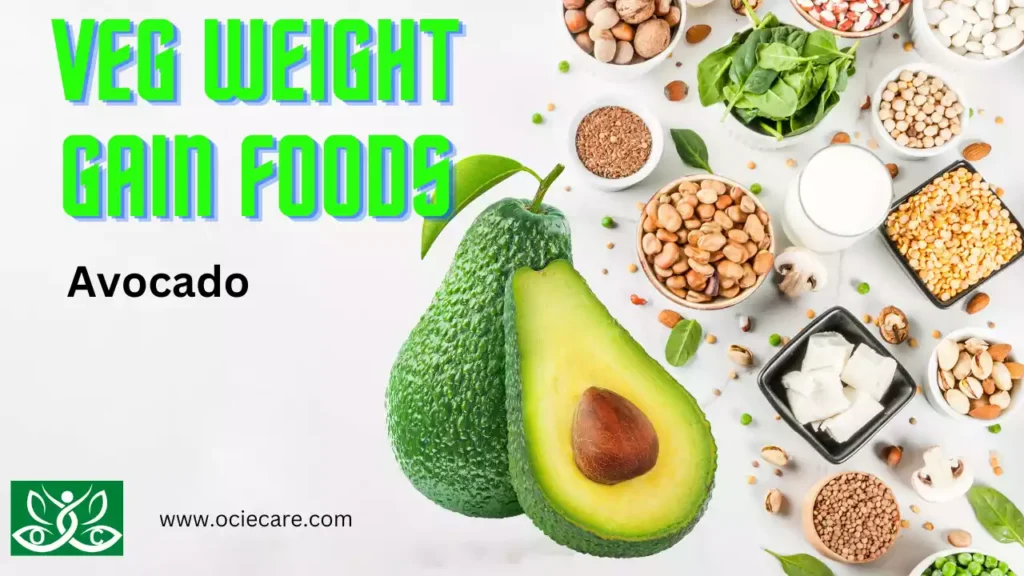
Avocado, often referred to as “nature’s creamy superfood,” is a unique and nutrient-packed fruit that has gained popularity worldwide for its delicious taste and numerous health benefits. This green gem is not only versatile in culinary creations but also offers an array of essential nutrients that contribute to overall well-being.
I. Creamy and Delicious:
- One of the most alluring features of avocados is their rich, creamy texture. When ripe, the flesh can be easily mashed or sliced, making it a delectable addition to salads, sandwiches, and wraps.
- The buttery taste of avocados enhances the flavor of various dishes, making them a favorite among food enthusiasts and health-conscious individuals alike.
II. Nutrient Powerhouse:
- Avocados boast an impressive nutritional profile, packed with essential vitamins and minerals.
- They are an excellent source of healthy monounsaturated fats, which are heart-friendly and contribute to lowering bad cholesterol levels.
- Additionally, avocados contain a good amount of potassium, which supports heart health and helps regulate blood pressure.
III. Rich in Fiber:
- Avocados are a great source of dietary fiber, promoting digestive health and regular bowel movements.
- The fiber content also aids in creating a feeling of fullness, making avocados an ideal addition to meals for those aiming for healthy weight gain.
IV. Loaded with Antioxidants:
- This superfood is rich in antioxidants, such as lutein and zeaxanthin, which are beneficial for eye health.
- These antioxidants help protect the eyes from harmful UV rays and may reduce the risk of age-related eye disorders.
V. Vitamins Galore:
- Avocados are a treasure trove of vitamins, including vitamin K, vitamin C, vitamin E, and several B vitamins.
- These vitamins play various roles in the body, supporting bone health, immune function, skin health, and metabolism.
VI. Versatile Culinary Ingredient:
- Avocado’s versatility in the kitchen makes it a go-to ingredient for both savory and sweet dishes.
- It can be used as a base for creamy sauces, spreads, and dressings, replacing less nutritious alternatives.
- Additionally, avocados can be incorporated into smoothies, and desserts, and even used as a healthy substitute for butter or mayonnaise in baking.
V. Incorporating Avocado into Your Diet:
- Adding avocados to your diet is simple and enjoyable. You can slice them onto toast, blend them into smoothies, mash them for guacamole, or top salads with avocado cubes.
- Its creamy texture and mild flavor make it a perfect complement to various dishes, making meals both satisfying and nutritious.
Nuts and Seeds – Nutrient-Dense Energy Boosters
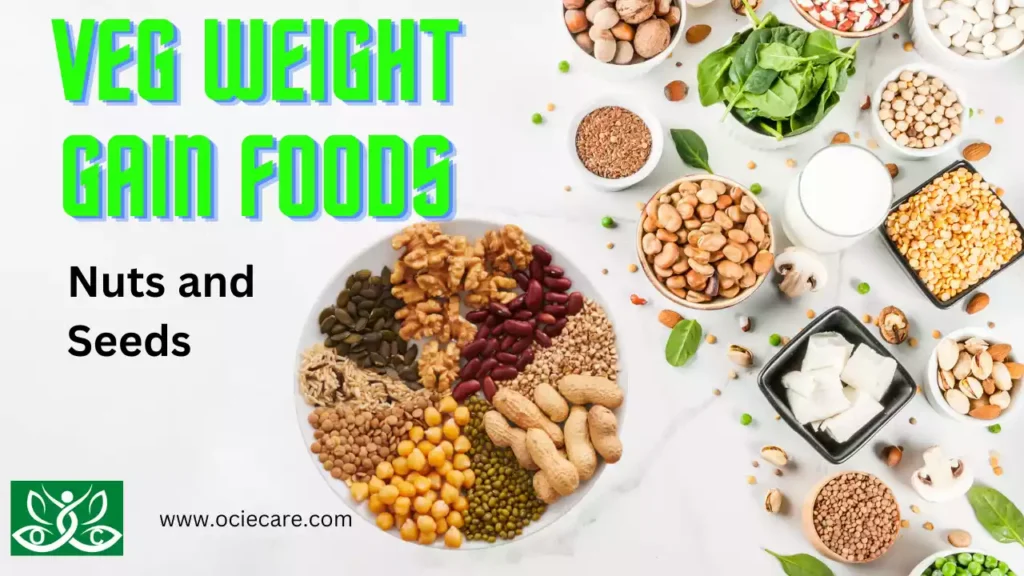
Nuts and seeds are nature’s nutrient-dense energy boosters, offering a plethora of health benefits in small, delicious packages. These tiny powerhouses are rich in essential nutrients, making them a valuable addition to any diet. Whether eaten as a convenient snack or incorporated into various dishes, nuts, and seeds provide a burst of energy and a wealth of nutrients.
I. Packed with Healthy Fats:
- Nuts and seeds are a great source of healthy monounsaturated and polyunsaturated fats, which are beneficial for heart health.
- These fats can help lower bad cholesterol levels and reduce the risk of heart disease.
- Incorporating a variety of nuts and seeds into your diet can contribute to a balanced fat intake and support overall well-being.
II. Plant-Based Proteins:
- For those following a vegetarian or vegan diet, nuts, and seeds offer an excellent source of plant-based proteins.
- These proteins contain essential amino acids, making them valuable for muscle repair and growth.
- Including a combination of nuts and seeds in meals or as snacks can help meet daily protein needs.
III. Vitamins and Minerals:
- Nuts and seeds are rich in vitamins and minerals, contributing to a well-rounded diet.
- They are excellent sources of vitamin E, which is an antioxidant that helps protect cells from oxidative stress.
- Additionally, they contain minerals such as magnesium, calcium, potassium, and iron, all of which play vital roles in supporting various bodily functions.
IV. Fiber-Rich Goodness:
- Fiber is essential for digestive health, and nuts and seeds provide a good amount of dietary fiber. Including these nutrient-packed foods in your diet can promote regular bowel movements and help maintain a healthy digestive system.
V. Antioxidant Powerhouses:
- Many nuts and seeds are abundant in antioxidants, which help combat oxidative damage in the body.
- These antioxidants, such as resveratrol in nuts and lignans in flaxseeds, contribute to overall well-being and may reduce the risk of chronic diseases.
VI. Energy-Rich Snacking:
- Nuts and seeds are convenient and energy-dense snacks that can be enjoyed on the go.
- Whether you prefer a handful of almonds, a mix of trail mix, or a small serving of pumpkin seeds, these portable snacks provide a quick and sustained energy boost.
VII. Incorporating Nuts and Seeds:
- There are countless ways to incorporate nuts and seeds into your daily diet.
- Sprinkle them over salads, yogurt, or oatmeal for added crunch and nutrition.
- Blend them into smoothies for a creamy and nutritious texture.
- You can also use ground nuts and seeds as a coating for meats or as an ingredient in energy bars and homemade granola.
VIII. Moderation and Allergies:
- While nuts and seeds offer numerous health benefits, it’s essential to consume them in moderation, as they are calorie-dense.
- Additionally, be mindful of any nut or seed allergies that you or others may have, and avoid them if necessary.
Quinoa – The Protein-Packed Grain
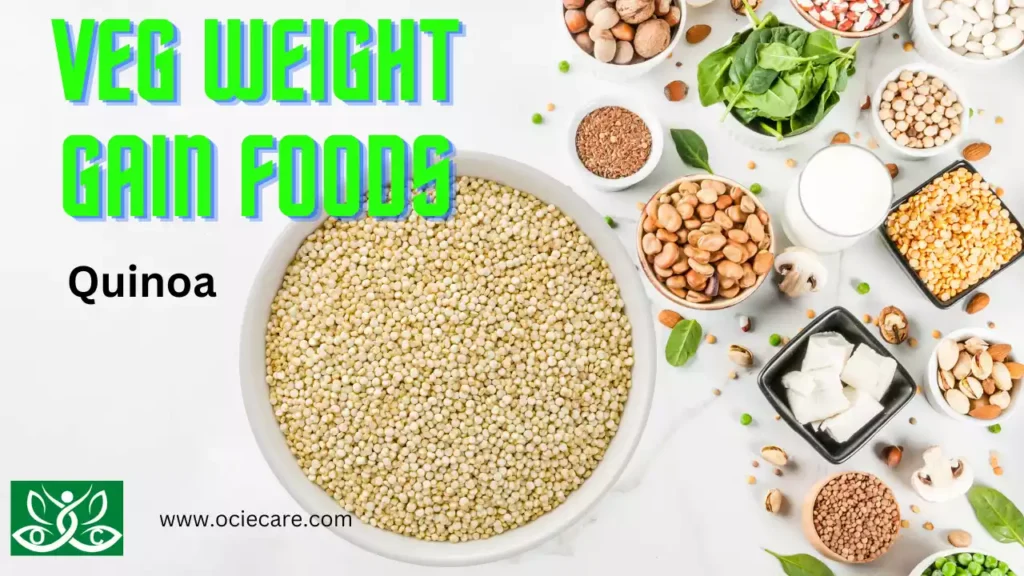
Quinoa, pronounced as “keen-wah,” is a remarkable grain that has gained widespread popularity due to its exceptional nutritional value. Often referred to as a superfood, quinoa is not only versatile in the kitchen but also offers a unique combination of nutrients that make it stand out among other grains.
I. Complete Plant-Based Protein:
- One of the most significant attributes of quinoa is its high protein content., Unlike most grains, quinoa is a complete protein source, containing all nine essential amino acids that the body cannot produce on its own.
- This makes it an excellent choice for vegetarians, vegans, and anyone looking to boost their protein intake.
II. Rich in Essential Nutrients:
- Quinoa is packed with essential nutrients that contribute to overall health and well-being.
- It is a good source of fiber, which supports digestion and helps maintain a healthy gut.
- Additionally, quinoa contains iron, magnesium, phosphorus, and zinc, all of which play vital roles in various bodily functions.
III. Gluten-Free and Easily Digestible:
- Quinoa is naturally gluten-free, making it an ideal option for individuals with celiac disease or those following a gluten-free diet.
- Furthermore, its structure allows for easy digestion, making it a gentle grain on the stomach and suitable for many people with digestive sensitivities.
IV. Versatile in Culinary Creations:
- Quinoa’s versatility in the kitchen is another reason for its popularity.
- It can be used in both savory and sweet dishes, adding a nutty flavor and a pleasant texture.
- From salads and grain bowls to soups, stir-fries, and even breakfast porridge, quinoa adapts well to a wide range of recipes.
V. Easy to Prepare:
- Cooking quinoa is simple and requires minimal effort.
- It can be prepared on the stovetop or in a rice cooker, and the cooking process usually takes around 15 to 20 minutes.
- Once cooked, quinoa expands and becomes fluffy, making it an appealing addition to any meal.
VI. Health Benefits:
- Incorporating quinoa into your diet can offer numerous health benefits.
- Its high protein content can help support muscle growth and repair, making it especially beneficial for athletes and those engaging in regular physical activity.
- The fiber in quinoa aids in weight management and supports digestive health, while its nutrient-rich profile contributes to overall vitality.
Sweet Potatoes – Wholesome and Nutritious
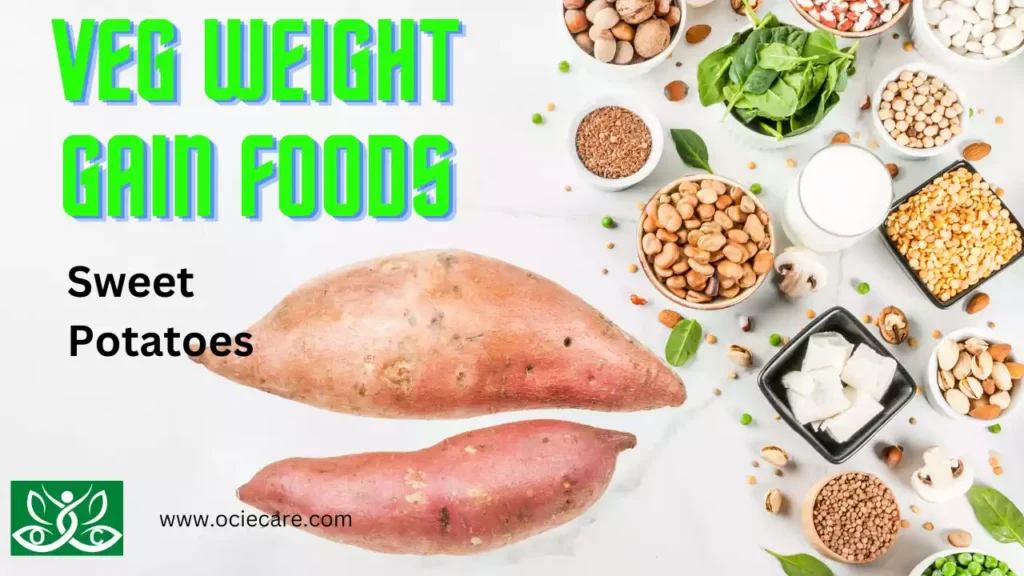
Sweet potatoes are not only delicious but also a wholesome and nutritious addition to any diet. These vibrant root vegetables are packed with essential nutrients, making them a favorite among health-conscious individuals and food enthusiasts alike.
I. Nutrient-Rich Goodness:
- One of the key reasons sweet potatoes are celebrated is their impressive nutrient profile.
- They are an excellent source of vitamins A and C, which support immune function and promote healthy skin.
- Additionally, sweet potatoes contain essential minerals like potassium, which help regulate blood pressure and support heart health.
II. Complex Carbohydrates:
- Sweet potatoes are an abundant source of complex carbohydrates, providing a steady and sustained release of energy.
- This makes them a valuable option for athletes and active individuals, as well as those seeking balanced and lasting energy throughout the day.
III. Dietary Fiber:
- Rich in dietary fiber, sweet potatoes contribute to digestive health by promoting regular bowel movements and supporting gut health.
- The fiber content also aids in creating a feeling of fullness, making sweet potatoes a beneficial addition to weight management plans.
IV. Antioxidant Powerhouses:
- The vibrant orange color of sweet potatoes is a result of their high antioxidant content, particularly beta-carotene.
- Antioxidants play a crucial role in neutralizing harmful free radicals in the body, reducing oxidative stress, and potentially lowering the risk of chronic diseases.
V. Versatile Culinary Ingredient:
- Sweet potatoes’ versatility in the kitchen makes them a versatile ingredient in various dishes.
- They can be roasted, boiled, mashed, or used in stews, soups, and casseroles.
- Additionally, they can be sliced into chips, blended into smoothies, or even used in desserts for natural sweetness.
VI. Gluten-Free and Allergy-Friendly:
- For individuals with gluten sensitivities or allergies, sweet potatoes are a safe and delicious option, as they are naturally gluten-free.
- Moreover, they are generally well-tolerated and a great alternative to other starchy vegetables.
VII. Balanced and Wholesome Meals:
- Incorporating sweet potatoes into your meals can help create well-balanced and wholesome dishes.
- Whether used as a side dish, a main course, or a snack, sweet potatoes provide a burst of nutrients and flavor that enhance any culinary creation.
Lentils – Protein and Fiber Powerhouse
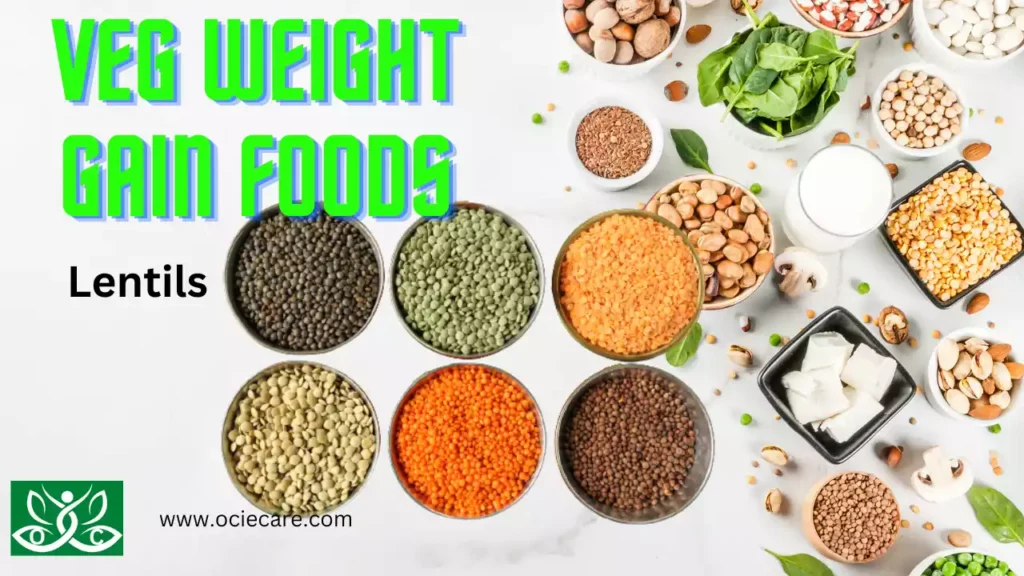
Lentils are a nutritional powerhouse, known for their exceptional protein and fiber content. These tiny legumes have been a dietary staple in many cultures for centuries, and for good reason – they offer a wealth of health benefits and are incredibly versatile in the kitchen.
I. Plant-Based Protein Source:
- Lentils are an excellent source of plant-based protein, making them an essential part of vegetarian and vegan diets.
- They contain all essential amino acids, making them a complete protein source that can contribute to muscle repair and growth.
II. Fiber-Rich Goodness:
- The high fiber content in lentils is beneficial for digestive health.
- It aids in maintaining regular bowel movements, prevents constipation, and supports a healthy gut microbiome.
- The combination of protein and fiber in lentils also helps create a feeling of fullness, making them a satisfying option for those looking to manage their weight.
III. Nutrient-Dense and Low in Fat:
- Lentils are nutrient-dense, providing essential vitamins and minerals such as folate, iron, phosphorus, and manganese.
- They are also low in fat, making them an excellent choice for individuals looking to reduce their saturated fat intake.
IV. Heart-Healthy Food:
- The soluble fiber found in lentils has been associated with improved heart health.
- It can help lower cholesterol levels and reduce the risk of heart disease.
- Including lentils in your diet can be a heart-smart choice to support cardiovascular well-being.
V. Slow-Burning Energy:
- Lentils are a complex carbohydrate that releases energy slowly, providing a steady and sustained source of fuel.
- This characteristic makes lentils a great choice for maintaining energy levels throughout the day and supporting an active lifestyle.
VI. Easy to Prepare and Versatile:
- Lentils are simple to cook and require no pre-soaking, unlike some other legumes.
- They can be used in a variety of dishes, including soups, stews, salads, curries, and even veggie burgers.
- Their mild flavor allows them to absorb the tastes of the ingredients they are cooked with, making them a flexible addition to many recipes.
VII. Budget-Friendly and Sustainable:
- Lentils are not only nutritious but also budget-friendly, making them an accessible food option for many people.
- Moreover, they have a lower environmental impact compared to animal-based protein sources, making them a sustainable choice for conscious eaters.
Coconut Products – Healthy Fats for Weight Gain
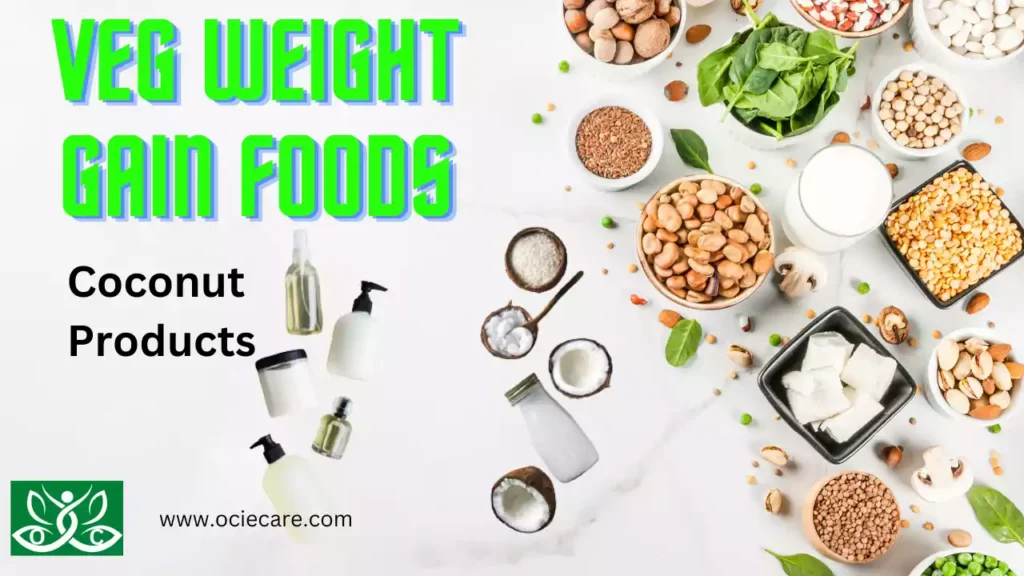
Coconut products are a fantastic addition to your diet if you’re aiming for healthy weight gain. While many might associate coconuts with high-fat content, these fats are the healthy kind that can be beneficial for overall well-being and weight management. Embrace the burstiness of flavors and textures that coconut products bring to your meals while enjoying their numerous health benefits.
I. Coconut Oil:
- Coconut oil is a popular choice for cooking and baking due to its high smoke point and unique flavor.
- It contains medium-chain triglycerides (MCTs), which are easily digested and can be quickly converted into energy.
- Using coconut oil in your meals can add a dose of healthy fats and contribute to your daily caloric intake.
II. Coconut Milk:
- Coconut milk is a creamy and delicious dairy-free alternative that can be used in both savory and sweet dishes.
- It adds richness to curries, soups, and sauces, and also serves as a base for smoothies and desserts.
- Coconut milk is a source of healthy fats that can help increase your calorie intake while providing a delightful tropical taste.
III. Coconut Cream:
- Coconut cream is thicker and richer than coconut milk, making it an indulgent addition to dishes like curries, puddings, and ice creams.
- Its luscious texture comes from the higher fat content, which can be beneficial for those looking to gain weight in a healthy way.
IV. Coconut Flour:
- Coconut flour is a gluten-free alternative to traditional flours, made from dried coconut meat.
- While it’s lower in fat compared to coconut oil or milk, it still provides healthy fats along with dietary fiber.
- Using coconut flour in your baking can add a pleasant coconut flavor to your treats while supporting your weight gain goals.
V. Coconut Water:
- Coconut water is a natural electrolyte-rich beverage that hydrates and refreshes.
- Although it’s not high in fat, it can complement your diet and help you stay hydrated while enjoying the tropical taste.
VI. Unsweetened Shredded Coconut:
- Unsweetened shredded coconut is a versatile ingredient that can be sprinkled over dishes or incorporated into recipes for added texture and flavor.
- It provides healthy fats and contributes to a satisfying eating experience.
VII. Coconut Butter:
- Coconut butter is made from pureed coconut meat and is an excellent spread for toast, pancakes, or waffles.
- It’s a calorie-dense option that can support your weight gain goals while delivering the natural goodness of coconuts.
VIII. Coconut Flakes:
- Coconut flakes are dried and thinly sliced pieces of coconut meat.
- They can be used in both sweet and savory dishes, adding a tropical twist to your culinary creations and providing healthy fats to your diet.
Chia Seeds – Omega-3 Rich Super Seeds
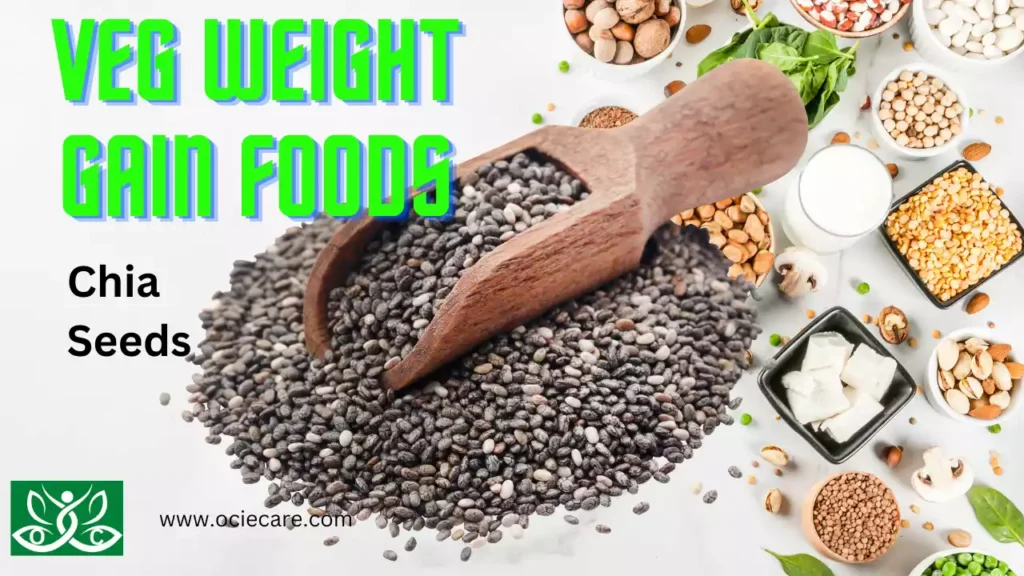
Chia seeds are small but mighty super seeds, known for their impressive nutritional profile and abundance of health benefits. These tiny black or white seeds have gained popularity worldwide due to their omega-3 fatty acid content and versatile culinary uses. Embrace the burstiness of flavors and textures that chia seeds bring to your dishes while enjoying their numerous health-promoting properties.
I. Omega-3 Fatty Acids:
- Chia seeds are a fantastic plant-based source of omega-3 fatty acids, particularly alpha-linolenic acid (ALA). Omega-3s are essential for heart health, brain function, and reducing inflammation in the body.
- Including chia seeds in your diet can help boost your omega-3 intake, especially for those following vegetarian or vegan diets.
II. Fiber-Packed Goodness:
- Chia seeds are rich in dietary fiber, which is beneficial for digestive health.
- When soaked in liquid, chia seeds form a gel-like consistency that can aid in digestion and contribute to a feeling of fullness.
- This can be particularly helpful for those looking to manage their weight.
III. Antioxidant-Rich:
- Chia seeds are a good source of antioxidants, which help protect the body from free radicals and oxidative damage.
- Antioxidants play a role in maintaining overall health and may reduce the risk of chronic diseases.
IV. Versatile Culinary Ingredient:
- Chia seeds are incredibly versatile and can be easily incorporated into various dishes.
- They can be sprinkled over salads, added to smoothies, mixed into yogurt, or used as an egg substitute in baking.
- Their neutral flavor and ability to absorb liquid make them a convenient addition to many recipes.
V. Hydration and Satiety:
- When soaked, chia seeds absorb liquid and expand, creating a gel-like substance.
- This unique property helps retain moisture and prolong hydration, making chia seeds an excellent option for athletes or those with active lifestyles.
- Additionally, the gel-like consistency can contribute to a feeling of fullness, aiding in appetite control.
VI. Nutrient-Rich Profile:
- In addition to omega-3s and fiber, chia seeds are packed with essential nutrients such as calcium, magnesium, phosphorus, and manganese.
- These minerals play vital roles in bone health, metabolism, and overall well-being.
VII. Easy to Store and Use:
- Chia seeds have a long shelf life and can be easily stored in a cool, dry place.
- Due to their small size and mild taste, they can be effortlessly added to various dishes without altering the overall flavor.
Nut Butter – Creamy and Delicious Source of Calories
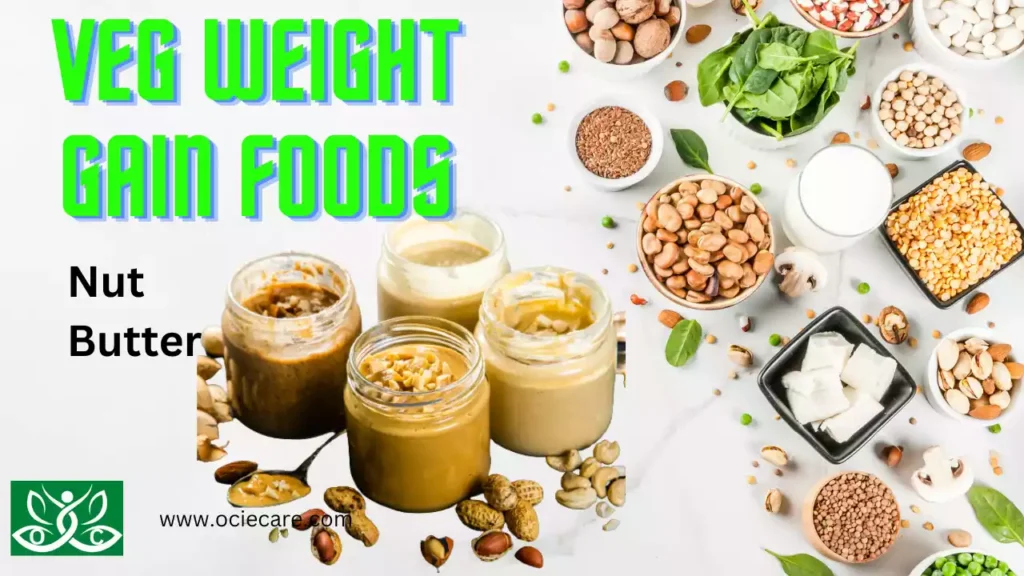
Nut butter is a delectable and creamy delight that serves as an excellent source of calories and essential nutrients. Made from ground nuts, this spreadable goodness is not only flavorful but also a versatile addition to a wide range of dishes. Embrace the burstiness of flavors and textures that nut butter brings to your meals while enjoying the nutritional benefits it offers.
I. Calorie-Dense Goodness:
- Nut butter is calorie-dense, making it a perfect option for those looking to increase their caloric intake in a healthy way.
- Whether you’re aiming for weight gain, sustained energy, or simply need a satisfying snack, nut butter provides a concentrated source of calories.
II. Healthy Fats:
- The primary component of nut butter is healthy fats, which are beneficial for heart health and overall well-being.
- The monounsaturated and polyunsaturated fats in nut butter can help reduce bad cholesterol levels and promote a healthy heart.
III. Protein-Packed Option:
- In addition to healthy fats, nut butter is also a good source of plant-based protein.
- It provides essential amino acids necessary for muscle repair, growth, and overall body function.
IV. Vitamins and Minerals:
- Nut butter contains a variety of essential vitamins and minerals, depending on the type of nuts used.
- For example, almonds are rich in vitamin E and magnesium, while peanuts provide niacin and manganese. This nutrient diversity contributes to overall health and wellness.
V. Versatility in Culinary Uses:
- Nut butter’s versatility in the kitchen is unmatched.
- It can be spread on toast, blended into smoothies, added to oatmeal, or used as a dip for fruits and vegetables.
- It can also be incorporated into savory dishes, desserts, and sauces, adding a rich and nutty flavor.
VI. Simple and Nutritious Snack:
- A spoonful of nut butter can be a quick and satisfying snack, providing an energy boost and satiating hunger.
- Pair it with fruits, crackers, or rice cakes for a balanced and nutritious bite.
VII. Natural and Nutrient-Rich:
- Opt for natural nut butter with minimal additives to enjoy the full benefits of the nuts’ natural nutrients.
- Avoid products with added sugars and hydrogenated oils, as these can diminish the health benefits of nut butter.
Tofu and Tempeh – Plant-Based Protein Alternatives
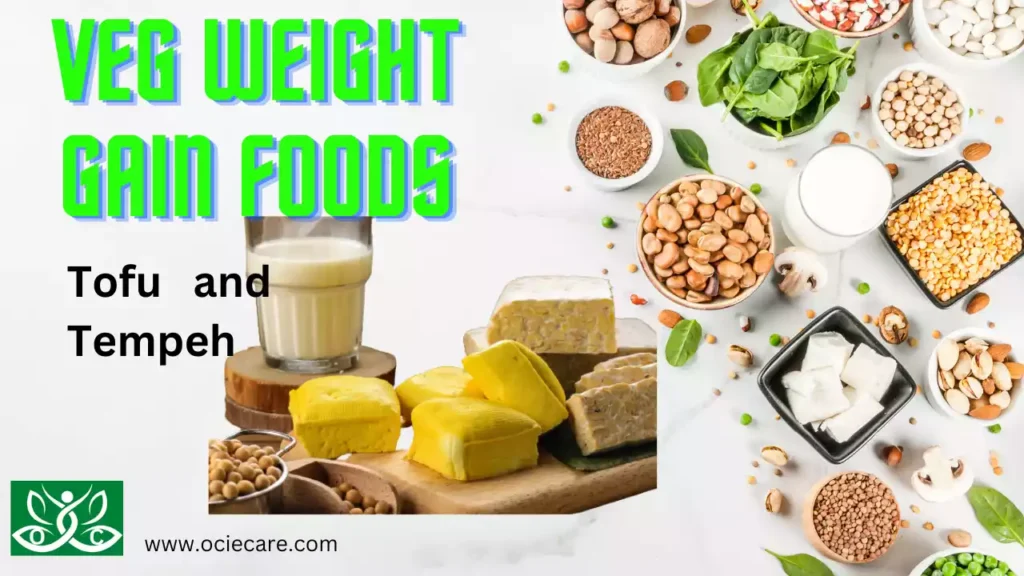
Tofu and tempeh are two versatile and nutritious plant-based protein alternatives that have become increasingly popular among those seeking meatless options or looking to reduce their animal product consumption. These soy-based products offer a range of health benefits, are rich in protein, and can be used in a variety of delicious dishes.
Embrace the burstiness of flavors and textures that tofu and tempeh bring to your meals while enjoying the plant-based protein goodness they offer.
Tofu:
I. Complete Protein Source:
- Tofu is made from coagulated soy milk and is an excellent source of complete protein, providing all essential amino acids that the body needs.
- This makes it a valuable option for vegetarians and vegans looking to meet their protein requirements.
II. Versatile in Culinary Uses:
- Tofu’s neutral taste and soft texture make it incredibly versatile in the kitchen.
- It can be marinated, grilled, sautéed, baked, or blended into smoothies, allowing for a wide range of dishes and culinary creations.
III. Low in Calories and Fat:
- Tofu is relatively low in calories and fat, making it an ideal ingredient for those looking to manage their weight or reduce saturated fat intake.
- It provides a filling and nutritious option without adding excessive calories.
IV. Rich in Nutrients:
- Tofu is a good source of various essential nutrients, including iron, calcium, magnesium, and vitamin B1.
- These nutrients play essential roles in supporting overall health and well-being.
V. Dairy-Free and Lactose-Free:
- Tofu is an excellent alternative for individuals with lactose intolerance or those following a dairy-free diet.
- It provides a creamy texture and can be used as a substitute for dairy in various recipes.
Tempeh:
I. Fermented and Nutrient-Rich:
- Tempeh is a fermented soy product, which enhances its nutritional value and digestibility.
- Fermentation breaks down anti-nutrients, making the nutrients more accessible to the body.
II. High Protein Content:
- Similar to tofu, tempeh is a valuable source of plant-based protein and contains all essential amino acids.
- Its firm texture makes it suitable for grilling, sautéing, or use as a meat substitute in dishes.
III. Gut-Friendly Probiotics:
- The fermentation process in tempeh promotes the growth of probiotics, which are beneficial for gut health and digestion.
- Including tempeh in your diet can support a healthy gut microbiome.
IV. Nutty and Earthy Flavor:
- Tempeh has a distinct nutty and earthy flavor that adds depth to dishes.
- It absorbs marinades and spices well, making it a flavorful addition to stir-fries, sandwiches, and salads.
V. Rich in Vitamins and Minerals:
- Tempeh provides an array of vitamins and minerals, including vitamin B2, manganese, and phosphorus.
- These nutrients contribute to various bodily functions and overall vitality.
Palak Saag | Recipe | Deliciously Nutritious Flavorful Indian Spinach Dish
Spinach – A Nutrient-Rich Leafy Green
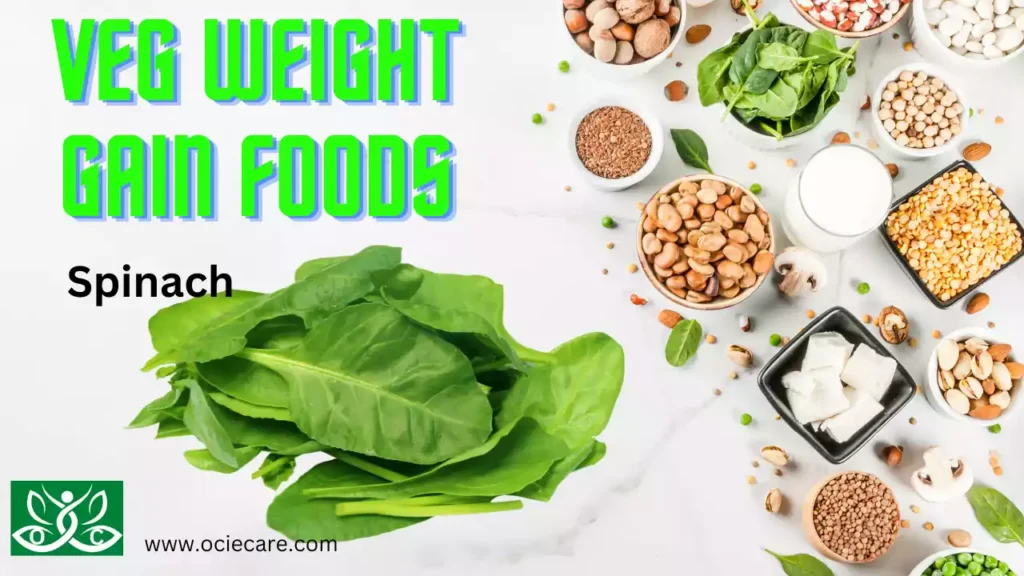
Spinach, often hailed as a nutritional powerhouse, is a leafy green vegetable packed with a plethora of essential nutrients. This vibrant and versatile green has earned its reputation as one of the healthiest foods available, making it a popular choice for those seeking to boost their overall well-being.
I. Vitamins and Minerals:
- Spinach is abundant in vitamins and minerals that support various bodily functions.
- It is an excellent source of vitamin K, which plays a key role in blood clotting and bone health.
- It also provides significant amounts of vitamins A, C, E, and several B vitamins, contributing to immune function, skin health, and energy metabolism.
III. Rich in Iron:
- Spinach is famously known for its iron content, which is essential for oxygen transport in the blood and preventing anemia.
- While the iron in spinach is non-heme iron (plant-based iron), it can still support overall iron intake, particularly when combined with vitamin C-rich foods that enhance iron absorption.
III. Antioxidant Power:
- Spinach is a treasure trove of antioxidants, including beta-carotene and lutein.
- These antioxidants help neutralize harmful free radicals in the body, reducing oxidative stress and potentially lowering the risk of chronic diseases.
IV. Fiber for Digestive Health:
- As a leafy green, spinach provides dietary fiber that supports digestive health and regular bowel movements.
- Including spinach in your diet can contribute to a healthy gut and aid in digestion.
V. Low in Calories, High in Nutrition:
- One of the advantages of spinach is its low-calorie content, making it an ideal option for those aiming to manage their weight.
- Despite its low caloric value, spinach is nutrient-dense, providing an array of vitamins and minerals per serving.
VI. Versatility in Culinary Uses:
- Spinach’s mild flavor and tender texture make it versatile in the kitchen.
- It can be used fresh in salads, sautéed as a side dish, blended into smoothies, or incorporated into various recipes such as soups, casseroles, and pasta dishes.
VII. Promotes Eye Health:
- Lutein, a carotenoid found in spinach, is beneficial for eye health and may help reduce the risk of age-related macular degeneration (AMD) and cataracts.
Weight Gain Supplements | Secrets Muscular Potential With 08 Supplements
Tips for Healthy Weight Gain and Lifestyle
While many focus on weight loss, healthy weight gain is equally important for those who are underweight or looking to build muscle mass. Gaining weight in a balanced and wholesome way involves making mindful choices in both diet and lifestyle.
I. Balanced Diet:
- Focus on a balanced diet that includes a variety of food groups.
- Incorporate lean proteins, healthy fats, complex carbohydrates, and a wide array of fruits and vegetables.
- Aim to eat regular meals and snacks throughout the day to increase your caloric intake.
II. Calorie Surplus:
- To gain weight, you need to consume more calories than your body burns.
- Calculate your daily caloric needs and aim for a surplus by adding calorie-dense foods to your meals.
III. Protein Intake:
- Ensure adequate protein intake to support muscle growth and repair. Include sources like lean meats, fish, dairy, tofu, tempeh, lentils, and nuts in your diet.
IV. Healthy Fats:
- Incorporate healthy fats from sources like avocados, nuts, seeds, olive oil, and coconut products.
- These fats provide concentrated calories and support overall well-being.
V. Nutrient-Rich Foods:
- Focus on nutrient-dense foods that provide vitamins, minerals, and essential nutrients.
- Vegetables, fruits, whole grains, and lean proteins should be an essential part of your diet.
VI. Resistance Training:
- Engage in regular resistance training exercises to build muscle mass.
- Weight lifting, bodyweight exercises, and resistance bands can help you gain muscle and strength.
VII. Hydration:
- Stay well-hydrated throughout the day.
- Adequate water intake supports overall health and can help maintain a healthy appetite.
VIII. Balanced Snacks:
- Opt for balanced snacks between meals to boost your calorie intake.
- Snack on nuts, yogurt, cheese, energy bars, or smoothies to add extra calories and nutrients.
IX. Avoid Empty Calories:
- Avoid excessive consumption of sugary and processed foods with empty calories.
- Focus on nutrient-rich options instead.
X. Gradual Weight Gain:
- Gaining weight too quickly can lead to unhealthy habits.
- Aim for a gradual and steady weight gain of about 0.5 to 1 pound per week.
XI. Regular Physical Activity:
- Engage in regular physical activity to support overall health.
- Moderate exercise can help stimulate your appetite and improve your fitness level.
XII. Manage Stress:
- Stress can impact appetite and weight gain. Practice relaxation techniques, such as meditation and yoga, to manage stress levels.
XIII. Seek Professional Guidance:
- If you’re struggling to gain weight or have specific health concerns, consider consulting a registered dietitian or healthcare professional for personalized guidance.
Stay Active and Maintain a Balanced Approach
Staying active and adopting a balanced approach to lifestyle is essential for overall health and well-being. Incorporating regular physical activity and making mindful choices in your daily routine can significantly impact your physical and mental health.
I. Regular Exercise:
- Engage in regular exercise that you enjoy.
- Whether it’s walking, jogging, cycling, dancing, or any other physical activity, staying active helps improve cardiovascular health, boost energy levels, and manage weight.
II. Mix Up Your Routine:
- Variety is the spice of life, even in exercise.
- Mix up your routine to avoid boredom and challenge different muscle groups.
- Try new workouts, join fitness classes, or explore outdoor activities to keep your exercise regimen fresh and exciting.
III. Find Active Hobbies:
- Incorporate physical activities into your hobbies.
- Gardening, hiking, swimming, or playing sports can be enjoyable ways to stay active while doing things you love.
IV. Prioritize Sleep:
- Ensure you get enough restorative sleep each night.
- A well-rested body is better equipped to handle daily challenges and recover from physical activities.
V. Practice Mindful Eating:
- Adopt mindful eating habits by paying attention to hunger and fullness cues.
- Choose nutrient-dense foods that nourish your body and support your overall well-being.
VI. Stay Hydrated:
- Drink plenty of water throughout the day to stay hydrated.
- Proper hydration is crucial for optimal bodily functions and helps maintain energy levels.
VII. Manage Stress:
- Find healthy ways to manage stress, such as meditation, yoga, deep breathing exercises, or spending time in nature.
- Stress management is essential for mental and emotional well-being.
VIII. Connect with Others:
- Maintain social connections with family and friends.
- Positive social interactions contribute to happiness and emotional balance.
IX. Take Breaks:
- Incorporate breaks into your daily routine, especially if you have a sedentary job.
- Stand up, stretch, and move around every hour to avoid prolonged sitting.
X. Practice Self-Compassion:
- Be kind to yourself and avoid self-criticism.
- Embrace a positive mindset and acknowledge your efforts towards a balanced lifestyle.
XI. Set Realistic Goals:
- Set achievable and realistic goals for your physical activity and lifestyle changes.
- Celebrate your progress, no matter how small, and be patient with yourself.
XII. Limit Screen Time:
- Reduce excessive screen time, especially before bedtime.
- Allocate time for other activities like reading, hobbies, or spending time with loved ones.
XIII. Seek Professional Support:
- If you’re struggling to maintain a balanced lifestyle or have specific health concerns, consider seeking support from a healthcare professional, counselor, or wellness coach.
Consult with a Nutrition Expert for Personalized Guidance
When it comes to making significant changes to your diet and lifestyle, seeking personalized guidance from a nutrition expert can be invaluable. A registered dietitian or nutritionist is trained to assess your individual needs, health goals, and medical history to create a tailored plan that suits your unique requirements.
I. Individualized Assessment:
- A nutrition expert will conduct a comprehensive assessment of your current diet, lifestyle, and health status.
- This evaluation will provide valuable insights into your nutritional needs and areas that may require improvement.
II. Goal Setting:
- Working with a nutrition expert allows you to set realistic and achievable health goals.
- Whether you aim to gain weight, manage a specific condition, improve athletic performance, or optimize overall well-being, a nutrition expert will create a roadmap to help you reach your objectives.
III. Personalized Meal Plans:
- Based on your nutritional needs and preferences, a nutrition expert will design personalized meal plans that suit your lifestyle and dietary requirements.
- These plans will consider your food preferences, cultural background, and any dietary restrictions you may have.
IV. Education and Support:
- A nutrition expert will educate you about the importance of balanced nutrition and its impact on your health.
- They will provide ongoing support, motivation, and guidance to help you stay on track with your health goals.
V. Evidence-Based Recommendations:
- Nutrition experts rely on evidence-based practices and the latest scientific research.
- Their recommendations are rooted in credible sources, ensuring that you receive accurate and reliable information.
VI. Addressing Nutrient Deficiencies:
- If you have specific nutrient deficiencies, a nutrition expert can help identify and address them through dietary adjustments and supplementation if necessary.
VII. Long-Term Sustainability:
- A nutrition expert will focus on creating a sustainable and enjoyable eating plan.
- They will teach you how to make healthy choices that you can maintain for the long term.
VIII. Accountability:
- Regular follow-up sessions with a nutrition expert provide a level of accountability, helping you stay motivated and committed to your health goals.
IX. Health Conditions and Allergies:
- If you have specific health conditions or food allergies, a nutrition expert can provide guidance on managing your diet to accommodate your needs.
X. Empowerment and Confidence:
- Working with a nutrition expert empowers you to take control of your health and make informed decisions about your diet and lifestyle.
Final Thoughts on Veg Weight Gain Foods
In conclusion, “veg weight gain foods” offer a wide range of nutritious and delicious options for those seeking to gain weight in a healthy and balanced manner. Embrace the burstiness of flavors and textures that these plant-based foods bring to your meals while supporting your weight gain goals and overall well-being.
I. Plant-Based Nutrition Powerhouses:
- “Veg weight gain foods” such as avocados, nuts, seeds, coconut products, tofu, tempeh, lentils, quinoa, sweet potatoes, spinach, and chia seeds provide an array of essential nutrients, including healthy fats, proteins, vitamins, and minerals. They are versatile ingredients that can be incorporated into various dishes, adding both flavor and nutritional value to your meals.
II. Wholesome and Satisfying:
- These foods not only support weight gain but also offer numerous health benefits. They contribute to heart health, digestive wellness, and overall vitality. Emphasizing a diet rich in these plant-based options can lead to improved energy levels, better nutrient absorption, and enhanced well-being.
III. Balanced Approach:
- When incorporating “veg weight gain foods” into your diet, maintaining a balanced approach is crucial. Ensuring an adequate intake of calories, proteins, healthy fats, and essential nutrients is key to supporting healthy weight gain and overall health. Pay attention to portion sizes, listen to your body’s hunger and fullness cues, and make mindful choices to achieve your weight goals sustainably.
IV. Personalization and Consultation:
- Individual needs and preferences vary, and it’s essential to tailor your diet to suit your specific requirements. Consider consulting with a nutrition expert, such as a registered dietitian or nutritionist, for personalized guidance. They can help you create a well-rounded meal plan that aligns with your health goals and ensures optimal nourishment.
V. Embrace the Journey:
- Weight gain, like any health goal, is a journey that requires patience and consistency. Embrace the process and celebrate small victories along the way. Keep in mind that gaining weight in a healthy way is just as important as losing weight, and it can positively impact your overall quality of life.
Final Thoughts:
Incorporating “veg weight gain foods” into your diet can be both enjoyable and rewarding. Embrace the burstiness of flavors and textures that these nutrient-packed foods bring to your meals. By adopting a balanced and mindful approach to your eating habits and lifestyle, you can achieve your weight gain goals while nurturing your body and overall well-being.
Remember that every individual’s journey is unique, so find what works best for you and enjoy the nourishing benefits of these wholesome plant-based foods.
FAQs
Q. Can a vegetarian diet support healthy weight gain?
A. Yes, a vegetarian diet can support healthy weight gain when appropriately planned. Including calorie-dense “veg weight gain foods” such as avocados, nuts, seeds, tofu, tempeh, lentils, quinoa, and coconut products can help increase caloric intake while providing essential nutrients.
Q. Are there specific vegetables that promote weight gain?
A. While most vegetables are low in calories, certain starchy vegetables like sweet potatoes can contribute to weight gain due to their higher calorie content. Additionally, vegetables can be paired with calorie-dense ingredients like nuts and seeds to enhance their weight gain potential.
Q. How can I incorporate “veg weight gain foods” into my diet without feeling overwhelmed?
A. Start by gradually introducing these foods into your meals and snacks. Mix them with your favorite dishes or add them to smoothies, salads, and sandwiches. Focus on variety and experiment with new recipes to keep your meals exciting.
Q. Can “veg weight gain foods” also benefit those looking to build muscle?
A. Absolutely! Many “veg weight gain foods” are also rich in proteins, making them suitable for those aiming to build muscle. Foods like tofu, tempeh, lentils, and quinoa are excellent plant-based protein sources that can support muscle growth and recovery.
Q. Is it essential to track calorie intake when trying to gain weight on a vegetarian diet?
A. Tracking calorie intake can be helpful in ensuring that you are consuming enough, calories to support weight gain. However, it’s essential to focus on the quality of the calories consumed and not solely on the quantity. Aim to include nutrient-dense foods along with calorie-dense options in your diet.
Q. Can a vegan diet provide enough nutrients for weight gain?
A. Yes, a well-planned vegan diet can provide all the necessary nutrients for weight gain. Vegans can obtain sufficient calories, proteins, healthy fats, vitamins, and minerals from a variety of plant-based foods, including “veg weight gain foods.”
Q. Are there any potential challenges or risks in gaining weight on a vegetarian diet?
A. Some challenges may include meeting increased caloric needs and ensuring adequate protein intake, especially for those with higher activity levels or specific health conditions. Consulting with a nutrition expert can help address these concerns and ensure a balanced approach to weight gain.
Q. How long does it typically take to see weight gain results on a vegetarian diet?
A. The rate of weight gain can vary from person to person based on factors such as metabolism, activity level, and individual body composition. In general, it’s essential to adopt a patient and consistent approach to healthy weight gain, aiming for gradual and sustainable progress.
Q. Can “veg weight gain foods” be included in a weight loss diet as well?
A. Yes, some “veg weight gain foods” can also be part of a weight loss diet when consumed in appropriate portion sizes. For weight loss, focus on nutrient-dense, low-calorie foods, and be mindful of overall caloric intake.
Q. Can “veg weight gain foods” be enjoyed by individuals with dietary restrictions or allergies?
A. Many “veg weight gain foods” are naturally gluten-free and suitable for individuals with dietary restrictions. However, it’s essential to check for potential allergens in specific products or recipes, especially for those with food allergies or intolerances. Always read labels and consult with a healthcare professional if needed.